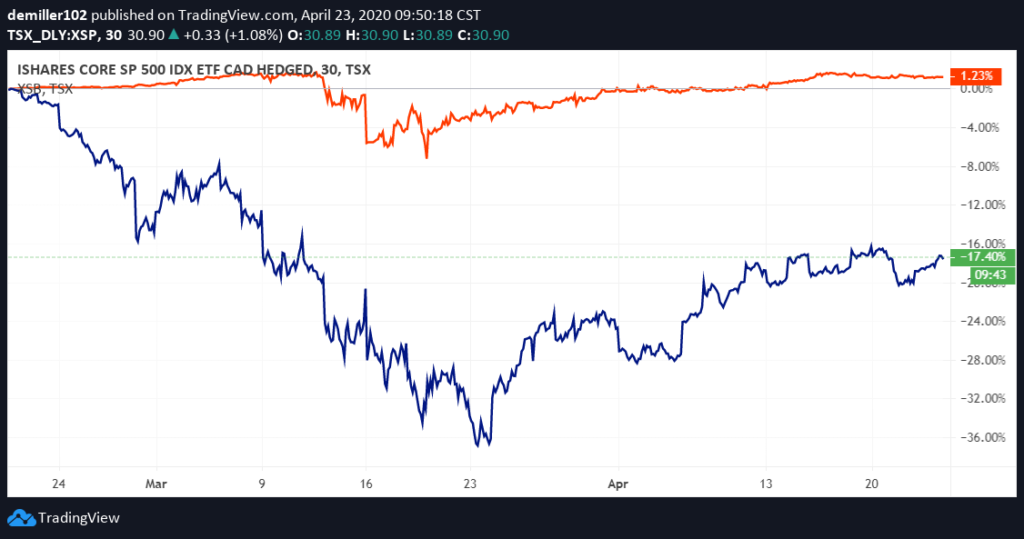
By David Miller, CFP, RFP
Special to the Financial Independence Hub
If you are feeling uneasy about your financial situation and your investment portfolio, you are not alone.
Our lives have changed. Right now, most of us are working from our home offices, suddenly teaching Algebra and Social Studies to our kids, and watching more Netflix than we should. Healthy behaviours have hopefully changed for the better, with extra hand washing and social distancing. Shaking hands may be a thing of the past.
The economy, for the most part, is shut down, so does that mean your investment behaviours should change too?
That depends …
- What kind of Plan have you committed to?
If you have an investment plan that looks to take advantage of the low prices during a downturn and if you have stuck with it during this unprecedented time, kudos to you! The panic selling during March 2020 dropped the S&P 500 (the ‘top’ 500 listed companies in the US) by 36%! Scary stuff that made a lot of people feel stressed out, and it feels like it could get worse. But let us check that feeling with historical facts.
March 3rd, 2009 was the technical bottom of the 2008/09 Financial Crisis, but no one recognized it until much, much later. Here is a quote from CNNMoney.com from that day 11 years ago; note the language:
“I think people are at a loss for answers right now,” said Larry Glazer, managing director at Mayflower Advisors. “Investors are mentally exhausted, and the market at multiyear lows has a psychological impact.”
He said it’s possible that the declines are part of a cycle the market needs to go through to get to healthier footing, but that, regardless of that, it’s very painful for investors in the near term.
“This is a risky market and investors need to ask themselves if the stocks they own are ones they want to own through an extended downturn,” said Robert Loest, portfolio manager at Integrity Funds. “If not, they should be raising cash.”*1
This language seems similar to the sentiment around today’s markets. Today is a much different situation but much of the same fear-based feelings are predicated in the media every day. I’m not saying that we’ve already seen the market bottom of this unprecedented event, but if you had followed the advice of the Portfolio Manager above and picked March 3rd, 2009 to sell your investments and raise cash, you just lost out on the best possible day to invest for the next 11 years. Just as no one could have predicted March 23rd, 2020 would be the day the markets would rebound for 20+ days after, even amid worsening Pandemic numbers and an evolving oil crisis.

The point is, no one knows where the market will go in the short-term. A lot of the market movement is based on fear and greed, not grounded economic reality and fundamentals. Holding a long-term view and a strategy to buy into these short-term panics is vital to investment success.
As an investment firm, we took a cautious approach that last week of March, dipping our toes into the water, selling only some of the short-term bonds that we hold and buying into the down markets. We did not buy exactly at the bottom, but we were close, buying near a 30% discount from February’s highs. If the equity markets drop down again, we will sell more of the safe assets and buy equity again.
What allows us to buy near the bottom during a panic? For each of our clients, we build a holistic strategy that includes a written commitment in the form of an Investment Policy Statement.
“Writing down your goals means that you can visually see them. This is an important point because when we see something, it affects how we act.”*2
- The Investment Policy Statement
Simply defined, an Investment Policy Statement (IPS) is our guide to how we invest your money. It lays out, in writing, your long-term goals, risk tolerance, methods to invest, expected long-term rates of return, downside risks, and corresponding asset allocation targets.
The true power behind the IPS is the asset allocation targets. Asset allocation, not stock picking, is the single biggest factor of your long-term investment success. This is setting targets on how much equity (and other risky assets) vs. fixed income (and other safer assets) you hold. From a broad perspective, this is a simple ratio of relatively uncorrelated assets.
Loss aversion is a strong emotion, making any tactical move to buy-in during a down market an incredibly difficult thing to do psychologically. But, by relying on our IPS guide, such a substantial drop forces us to rebalance the equity portion by selling fixed income and purchasing additional equities in order to maintain the equity target.
The ratio, and make up, of every portfolio is unique for every client depending on the client’s age, investment knowledge/sophistication, risk tolerance and needed rate of return for their specific goals. More risk usually equates to a higher rate of return and too much of a safe asset can drag on portfolio returns over the long-term. Too much risk may create a wild ride and may not provide enough buying power when markets fall.
Utilizing an IPS leads to more discipline and a more consistent, even predictable, long-term rate of return. When it comes to planning for your retirement, isn’t that exactly what you should want?
This is exactly how we invest for ourselves. We sleep easy at night knowing our investments are guided by the IPS we committed to as part of a holistic plan.
- Having a Pre-commitment to a Plan
During times of high stress or unease, your irrational mind can take over. Today’s uncertain reality is a perfect example of a time to be sure you are making rational decisions rather than decisions based on short-term fear or greed. Successful investing is about being consistent and level-headed.
“…being consistent is best achieved by making a commitment. Thus pre-committing to a goal is one of the most frequently applied behavioral devices to achieve positive change”*3
If you are feeling uneasy about your investments, now is a great time to sit back and think logically, as best as possible, about your overall financial situation. Think big picture: how bad is it really? Take a deep breath and then go review your plan with a Financial Planning Professional.
A Financial Planning Professional is the best person possible to look at your overall situation and remind you of your priorities and the big picture.
- Building a Personal Financial Plan
Ensuring you have an investment plan is one thing, but if you haven’t made a financial plan, you may still be facing unforeseen risks.
Financial stress can have a serious impact on your mental health*4, which in turn can affect your physical health.
Here’s what you should be focusing on to stay financially healthy:
- As above: a pre-commitment to an investment strategy that is linked to your personal goals via an Investment Policy Statement.
- Tax efficiency: ensuring your investments are set up to save taxes, not just today, but throughout retirement.
- Life and Disability insurance: how do you know you have enough and are adequately protecting your family from life and health risks?
- Wills, Powers of Attorney and Personal Directive: reviewing to ensure you and your family are protected if you die, or otherwise unable to make personal financial and health decisions.
- Liquidity: have extra short-term savings or access to low interest credit, for a potential job loss, sickness, or time off work to take care of your children.
- Savings plan: for all your family’s short and long-term goals.
- Above all: strive for an organized and simplified financial life!
During these unprecedented times, having a financial plan will undoubtedly improve your outlook. Now is the time to make sure you and your family, and your finances, are looked after.
For more information on our investment philosophy or specific financial planning help with your specific situation, please contact us through www.rtmosaic.com.
RT Mosaic is a registered portfolio management and financial planning firm based in Calgary, AB.
 David Miller, BFS, CFP®, R.F.P., CIM®, is RT Mosaic’s dedicated financial planner and research analyst, providing expert planning, advice, research and support. Along with an honors degree from Mount Royal University’s Bachelor of Financial Services Applied program in 2005, David is a Certified Financial Planner® Professional (2007), Chartered Investment Manager® (2014) and Registered Financial Planner (2017). David has been providing advice to high net worth and affluent individuals and families for over 10 years. He left a major bank in 2016 to help fulfill his drive to provide client centered advice. David prides himself on providing Canadians with the ability to make informed financial decisions with increased financial literacy and support.
David Miller, BFS, CFP®, R.F.P., CIM®, is RT Mosaic’s dedicated financial planner and research analyst, providing expert planning, advice, research and support. Along with an honors degree from Mount Royal University’s Bachelor of Financial Services Applied program in 2005, David is a Certified Financial Planner® Professional (2007), Chartered Investment Manager® (2014) and Registered Financial Planner (2017). David has been providing advice to high net worth and affluent individuals and families for over 10 years. He left a major bank in 2016 to help fulfill his drive to provide client centered advice. David prides himself on providing Canadians with the ability to make informed financial decisions with increased financial literacy and support.
Disclaimer: This post should not be construed or interpreted to be investment advice or direct financial planning advice. Any data, information and content on this blog is for information purposes only and should not be construed as an offer of advisory services. Related information is presented ‘as is’ and does not make any express or implied warranties, representations or endorsements whatsoever with regard to any products or service. It is solely your responsibility to evaluate the accuracy, completeness and usefulness of all opinions and information provided. This post does not warrant and makes no representations about the accuracy, reliability, completeness or timeliness of the content, be error-free or that defects in the information will be corrected. The law is constantly changing, and your situation should always be consulted with the proper professional. All links and images have been cited and are owned by those individuals under their individual sites.
- Twin A., CNNmoney.com, (March 3rd, 2009) “Stocks at 12 Year Lows”, https://money.cnn.com/2009/03/03/markets/markets_newyork/?postversion=2009030311
- Carlyle J. management30.com (December 4, 2018) “How Writing Down Your Goals Will Increase Personal Success Tenfold”, https://management30.com/blog/writing-down-goals-for-success/
- Behavioraleconomics.com, “Precommitment” https://www.behavioraleconomics.com/resources/mini-encyclopedia-of-be/precommitment/
4. Morin, A. psycologytoday.ca (2015) “What your Financial Health Says About Your Mental Health”, https://www.psychologytoday.com/ca/blog/what-mentally-strong-people-dont-do/201507/what-your-financial-health-says-about-your-mental


